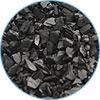 It might easily be said that carbon water filters of one kind or another have stood the test of time. Literally for thousands of years, people have been using carbon in the form of charcoal to purify water and make it safer to drink. The ancient Egyptians, Greeks, and East Indians were the first to recognize the ability of charcoal to clean not only disagreeable turbidity from water, but also to remove bad smells.
It might easily be said that carbon water filters of one kind or another have stood the test of time. Literally for thousands of years, people have been using carbon in the form of charcoal to purify water and make it safer to drink. The ancient Egyptians, Greeks, and East Indians were the first to recognize the ability of charcoal to clean not only disagreeable turbidity from water, but also to remove bad smells.
Although humanity was unaware that microorganisms were responsible for many diseases, they did know that boiling water made it safe to drink, and that those who ran their water through a jar or cloth sleeve of charcoal were much less likely to become ill than those who did not. Gravity feed filters that combined activated charcoal within a ceramic shell accompanied early English missionaries to India, China, and Africa, making it much less likely that they or their families would become ill from the endemic diseases spread through water in those localities.
How Carbon Works for You
Today’s carbon based water filters use activated charcoal to trap contaminants. Activated charcoal is charcoal that has been treated with steam, and infused with oxygen, to make the charcoal massively pitted. The numerous pits in activated charcoal result in a small volume of carbon having a relatively enormous surface area.
When water passes through activated carbon, the process of adsorption takes place. Any contaminants present will wind up sticking to the carbon, which effectively traps them. By the time the water has percolated through the filter, organic and inorganic pollutants have been removed. Carbon can remove nearly all the organic and inorganic contaminants that could find their way into your drinking water: gasoline, benzene, herbicides, pesticides, detergents, turpentine, and aldicarb.
However, you cannot count on an activated carbon filter to remove all bacteria and viruses, although the ceramic/charcoal gravity feed filters will handle these without problem.
Activated Charcoal Filters
Today, activated charcoal is generally used in combination with other methods to assure a more complete removal of pathogens. The old standby of countertop filters with candles will still provide you with clean, pure water, but other solutions will include:
- Ion exchange filters must be used in combination with carbon filters to effectively remove all contaminants from water.
- Reverse osmosis water purification units consist of a variable number of chambers through which the water is forced in order to clean it completely. One of the elements in these filters will contain activated carbon.
- UV filtration systems rely upon ultraviolet light to kill bacteria, viruses, and protozoans like giardia and cryptosporidium. However, once again, activated charcoal must be part of the assembly to remove VOCs and other organic and inorganic pollutants.
All of the above filtration solutions can be used as filters that sit on the countertop, are installed beneath the sink, or are incorporated into a whole house water purification system.


Share:
Why Mothers to Be Should Use Water Filters
Does Your Well Water Have Bacteria in it?